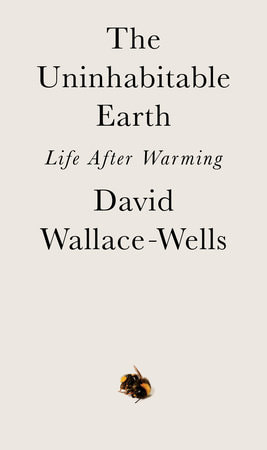- Home
- Process Worldview
- Community
- Art and Music
- Whitehead and Process Thinking
- Podcasts
- Spirituality
- Ecological Civilization
- Education
- Contact
- Social Justice
- Science
- Animals
- Sacred Poems
- Whitehead Videos
- Index of All Titles
- Practicing Process Thought
- Process Spirituality: A Spiritual Alphabet
- Recent Posts
280 billion songbirds lost.
My grief is complete.
A Poem by David DeBus after reading The Uninhabitable Earth
In his new book The Uninhabitable Earth: Life After Warming, David Wallace-Wells explores how climate change will impact not just the planet, but human lives – including how a five degree increase in temperatures would make parts of the planet unsurvivable. |
I Was A Friend
T’ang Dynasty Recollections
I was a friend of Li P’ai
who wandered drunkenly
among heaven-ordained
green grasses, earth-rammed walls
saw swans overhead
and did not shout at them
heard the clatter of geese congealing
at the edge of the lake
in the falling light
like the geese in my grandfather’s lake
who pecked at us as children
280 billion songbirds already absent this year 2020
My brother says the T’ang Dynasty is one of two
times when the Japanese let foreign influences enter
before the modern era: Buddism and Chinese writing
and now “stars shine on white bones’
it is two hundred years from now
and my grief is complete, my joy is benumbed
my failure to do absolutely everything
to stop our species-death preceded
by enormities of distress and cruelty
I just could not feel enough grief
for it to stay real at every moment to me
David DeBus, January 5, 2019, The Grove, Scripps Ranch Inspired by The Uninhabitable Earth: After Global Warming by David Wallace-Weeks. Li P'ai is sometimes transcribed as Li Bai. The third stanza is an aside from his brother, noting that, before the modern era, Japan permitted both Buddhism and the writing of Chinese characters to enter from this fertile dynasty. The line "stars shine on white poems" comes from from Under Heaven by Guy Gavriel Kay.
who wandered drunkenly
among heaven-ordained
green grasses, earth-rammed walls
saw swans overhead
and did not shout at them
heard the clatter of geese congealing
at the edge of the lake
in the falling light
like the geese in my grandfather’s lake
who pecked at us as children
280 billion songbirds already absent this year 2020
My brother says the T’ang Dynasty is one of two
times when the Japanese let foreign influences enter
before the modern era: Buddism and Chinese writing
and now “stars shine on white bones’
it is two hundred years from now
and my grief is complete, my joy is benumbed
my failure to do absolutely everything
to stop our species-death preceded
by enormities of distress and cruelty
I just could not feel enough grief
for it to stay real at every moment to me
David DeBus, January 5, 2019, The Grove, Scripps Ranch Inspired by The Uninhabitable Earth: After Global Warming by David Wallace-Weeks. Li P'ai is sometimes transcribed as Li Bai. The third stanza is an aside from his brother, noting that, before the modern era, Japan permitted both Buddhism and the writing of Chinese characters to enter from this fertile dynasty. The line "stars shine on white poems" comes from from Under Heaven by Guy Gavriel Kay.
The Sounds of a DoveBirds After Rain |
The Sounds of Geese FlyingMeadowlark |
Apocalypse Fatigue:
A Role for Poetry
Many people suffer from apocalypse fatigue around climate change. It's too big, too abstract, and too much.
Click here for an essay by Norwegian Parliament representative Per Espen Stoknes on how to move past it. He recommends reframing the issue in three ways. Here's an excerpt.
Click here for an essay by Norwegian Parliament representative Per Espen Stoknes on how to move past it. He recommends reframing the issue in three ways. Here's an excerpt.
"More than 80 percent of all news and mainstream media play up the issue of doomsday or catastrophe. From psychological research, we know that if you overdo the threat of catastrophe, you make people feel fear or guilt or a combination. But these two emotions are passive. They make people disconnect and avoid the topic rather than engage with it.
There are three main frames that seem to create more engagement and work much better than catastrophe framings or other negative framings.
One framing involves speaking about climate change as a health issue concerning people we care about—our families, our children. We don’t want respiratory disease, so we all want clean air. The second is a safety or insurance framing. It’s about being prepared or ready in case something goes in the wrong direction—a risk management approach, that speaks to business/financial people. They work actively and professionally with risk and understand the need to insure. Finally, we should speak about opportunities for smarter cities, smarter buildings, better food sources, smarter energy systems and transportation systems, and all the opportunities that empowerment from these technologies gives us for better lives.
If we are able to reframe the climate issue this way in our society’s discourse, there is less fear and guilt attached to it—more a sense of “collective efficacy” or the idea that we can do something together as a society. Now, this deep reframing of the issue takes time—it’s different than simply having a slogan or a new news headline. But reframing impacts how people feel about and perceive the issue."
I appreciate these forms of reframing, but also appreciate the whole-hearted, full-bodied despair expressed in David Debus' poem. There is something cleansing and purging about owning up to despair. Something honest about guilt and hopelessness. In the spiritual alphabet of humanity as developed by Frederic and Mary Ann Brussat in Spirituality and Practice, this honesty is a dimension of "owning the shadow."
The spiritual practice of shadow encourages us to make peace with those parts of ourselves that we find to be despicable, unworthy, and embarrassing — our anger, jealousy, pride, selfishness, violence, and other "evil deeds." In Christianity, shadow aspects show up as the seven deadly sins. Muslims talk about nafs as our lower selves, and Buddhists refer to negative emanations of mind. Societies and cultures also have dark sides.
We need poems of despair, such as offered by David DeBus, to help us own the shadow.
And yet Debus would not have written his poem in the first place if he didn't carry within his heart a lingering sense that something can be done, not to avoid climate change, but to reduce its damage to whatever extent possible. The lament "I could not feel enough grief" looks to the past. But the lifting up of the model of the great Daoist poet, Li P'ai, "who wandered drunkenly among heaven-ordained green grasses, earth-rammed walls, and saw swans overhead," while ostensibly recalling a distant past, also functions as what process theologians call a "lure for feeling." And lures come from the existential future, as a beckoning of what can be, even if only in the past. As I read the poem, I cannot help but wish for wild swans overhead and the calling of geese. I could not have thus wished, had it not been for the lament. The hope depends on the contrast. It comes only within and alongside the lament.
Eliza Barclay and Umair Irfan speak of Ten Ways to reduce the impact of climate change. Cannot we also add an eleventh way? Own the despair. Acknowledge the guilt. Experience the helplessness -- and then write a poem. Let the poem be a ritual of honesty and also, in some quiet way, hope for some kind of salvage, however modest compared to the richness of the bio-spiritual world as we've known it.
We need poems of despair, such as offered by David DeBus, to help us own the shadow.
And yet Debus would not have written his poem in the first place if he didn't carry within his heart a lingering sense that something can be done, not to avoid climate change, but to reduce its damage to whatever extent possible. The lament "I could not feel enough grief" looks to the past. But the lifting up of the model of the great Daoist poet, Li P'ai, "who wandered drunkenly among heaven-ordained green grasses, earth-rammed walls, and saw swans overhead," while ostensibly recalling a distant past, also functions as what process theologians call a "lure for feeling." And lures come from the existential future, as a beckoning of what can be, even if only in the past. As I read the poem, I cannot help but wish for wild swans overhead and the calling of geese. I could not have thus wished, had it not been for the lament. The hope depends on the contrast. It comes only within and alongside the lament.
Eliza Barclay and Umair Irfan speak of Ten Ways to reduce the impact of climate change. Cannot we also add an eleventh way? Own the despair. Acknowledge the guilt. Experience the helplessness -- and then write a poem. Let the poem be a ritual of honesty and also, in some quiet way, hope for some kind of salvage, however modest compared to the richness of the bio-spiritual world as we've known it.
Eleven Ways to Reduce the
Impact of Climate Change
1) Price carbon emissions
2) Subsidize clean energy, and end subsidies for dirty energy
3) Close coal plants, and cut off the fossil fuel supply in other ways
4) Electrify everything and get more efficient
5) Invest in innovation
6) End production and sales of cars, trucks, and buses that run on fossil fuels
7) Require “zero deforestation” supply chains
8) Keep aging nuclear plants running
9) Discourage meat and dairy consumption, encourage plant-based diets
10) Remove carbon dioxide from the atmosphere
11) Write poems, tell stories, sing songs
2) Subsidize clean energy, and end subsidies for dirty energy
3) Close coal plants, and cut off the fossil fuel supply in other ways
4) Electrify everything and get more efficient
5) Invest in innovation
6) End production and sales of cars, trucks, and buses that run on fossil fuels
7) Require “zero deforestation” supply chains
8) Keep aging nuclear plants running
9) Discourage meat and dairy consumption, encourage plant-based diets
10) Remove carbon dioxide from the atmosphere
11) Write poems, tell stories, sing songs

